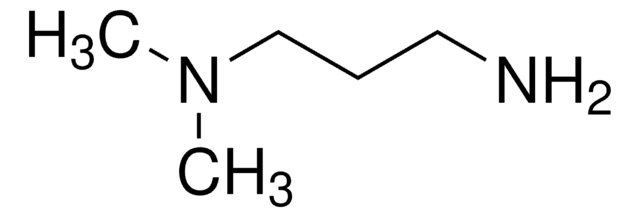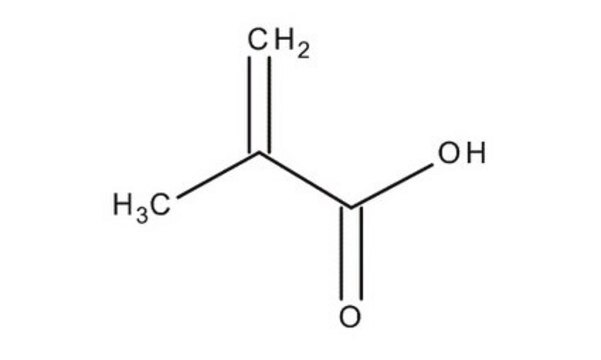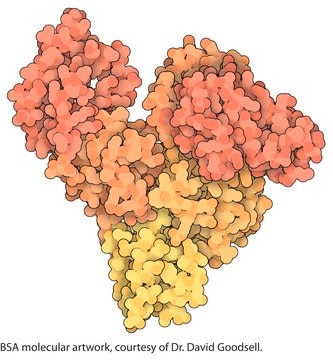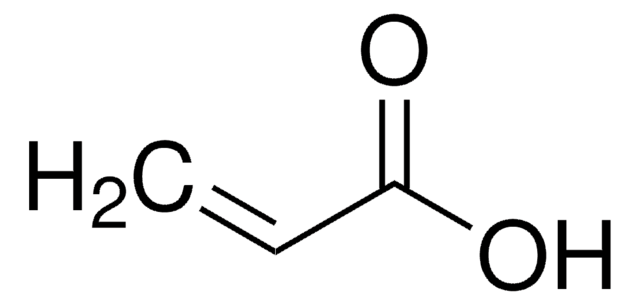8.03503
N,N-Dimethyltrimethylenediamine
for synthesis
Synonym(s):
N,N-Dimethyltrimethylenediamine, 3-Dimethylaminopropylamine, N,N-Dimethyl-1,3-propanediamine, N,N-Dimethyl-1,3-diaminopropane
About This Item
Recommended Products
vapor pressure
17 hPa ( 30 °C)
Quality Level
form
liquid
autoignition temp.
215 °C
potency
1640 mg/kg LD50, oral (Rat)
expl. lim.
2.3-12.35 % (v/v)
pH
12.7 (20 °C, 100 g/L in H2O)
bp
132-140 °C/1013 hPa
mp
<-50 °C
transition temp
flash point 32 °C
density
0.82 g/cm3 at 20 °C
storage temp.
2-30°C
InChI
1S/C5H14N2/c1-7(2)5-3-4-6/h3-6H2,1-2H3
InChI key
IUNMPGNGSSIWFP-UHFFFAOYSA-N
Application
- Synthesis and Characterization of Ruthenium Metal Complexes of Polydentate Pyridine-based Ligands: Describes the behavior of platinum complexes with N,N-Dimethyltrimethylenediamine as ligands, focusing on their binding properties (D MAPOLELO et al., ResearchGate).
- New Water-Soluble Poly (propylene imine) Dendrimer Modified with 4-Sulfo-1, 8-naphthalimide Units: Discusses the acquisition of N,N-Dimethyltrimethylenediamine for use in dendrimer synthesis, contributing to enhanced sensing properties (AI Said et al., MDPI Sensors, 2023).
- Electrocatalytic hydrogen production and carbon dioxide conversion: Mentions the use of N,N-Dimethyltrimethylenediamine in preparing metal complexes for catalysis (S Sengupta et al., Polyhedron, 2020).
- Viscosities and deviations in viscosity of tert-butanol with various amines: Includes study on solutions of N,N-Dimethyltrimethylenediamine, exploring its effects on viscosity (FI Chowdhury et al., Journal of Molecular Liquids, 2014).
Signal Word
Danger
Hazard Statements
Precautionary Statements
Hazard Classifications
Acute Tox. 4 Dermal - Acute Tox. 4 Oral - Eye Dam. 1 - Flam. Liq. 3 - Skin Corr. 1B - Skin Sens. 1 - STOT SE 3
Target Organs
Respiratory system
Storage Class Code
3 - Flammable liquids
WGK
WGK 1
Flash Point(F)
89.6 °F - closed cup
Flash Point(C)
32 °C - closed cup
Certificates of Analysis (COA)
Search for Certificates of Analysis (COA) by entering the products Lot/Batch Number. Lot and Batch Numbers can be found on a product’s label following the words ‘Lot’ or ‘Batch’.
Already Own This Product?
Find documentation for the products that you have recently purchased in the Document Library.
Our team of scientists has experience in all areas of research including Life Science, Material Science, Chemical Synthesis, Chromatography, Analytical and many others.
Contact Technical Service








